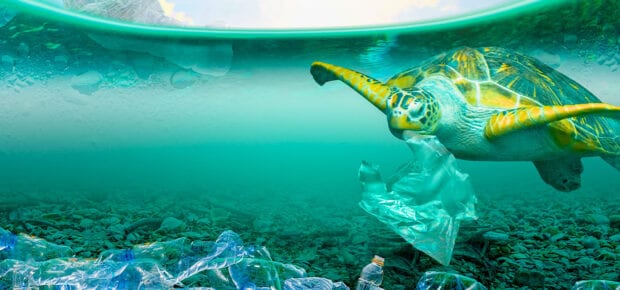September 17, 2020
Plastics that are dumped into our oceans, rivers, lakes and shores are dangerous for marine life because as they break down, they turn into smaller pieces of plastic called microplastics that fish, marine mammals and birds often mistake for food. Microplastics are dangerous for fish because plastic does not fully biodegrade and can cause adverse health effects in the fish and the animals that eat them. Luckily, technologists like IEEE member Krista Beardy, use technology to help monitor and understand how plastic is negatively affecting the waters we use daily.
“The research I am conducting can be classified as a ‘baseline’ analysis,” says Beardy. “To rectify the problem of marine based plastic pollution, we must first understand and identify all facets of the situation we are currently facing. From the chemistry behind polymer science, to the effects on marine wildlife, to how ocean currents distribute and concentrate plastic pollution, all of these questions have yet to be answered in full.”
Beardy explains that plastic is not actually toxic – it’s the additives like thermoplastics, polypropylene, polyethylene and polyvinyl chloride that we put into plastic that are dangerous for marine life to consume.
“The problem is that plastic is very rarely just plastic,” says Beardys. “These plastic products are enriched with a variety of additives that are designed to improve performance, to reduce costs and to enhance those final properties.”
Innovative Technologies Recycling Plastics
Utilizing drones, robotics and AI technology helps researchers understand and monitor our oceans and waterways to ensure that all living organisms have a clean environment. Beardy also explains that there are a lot of innovative ideas being explored to help society in reduction, reuse and recycle programs.
“Ideas have emerged such as using plastic surplus for roadways, bricks and other building materials, to the use of plastic-to-fuel pyrolysis technology,” says Beardy. “Research is also ongoing on developing polymers and polymer substitutes that possess the capacity for accelerated degradation.”
Ultimately, the goal is to see microplastics eliminated in our global waters. We are hopeful that technologies that Beardy and other technologists are developing will help reduce our plastic waste and keep marine life and the waters they inhabit healthy.






 The Impact of Technology in 2025
The Impact of Technology in 2025 Quantum and AI: Safeguards or Threats to Cybersecurity?
Quantum and AI: Safeguards or Threats to Cybersecurity? Why AI Can't Live Without Us
Why AI Can't Live Without Us Bits, Bytes, Buildings and Bridges: Digital-Driven Infrastructure
Bits, Bytes, Buildings and Bridges: Digital-Driven Infrastructure Impact of Technology in 2024
Impact of Technology in 2024 Emerging AI Cybersecurity Challenges and Solutions
Emerging AI Cybersecurity Challenges and Solutions The Skies are Unlimited
The Skies are Unlimited Smart Cities 2030: How Tech is Reshaping Urbanscapes
Smart Cities 2030: How Tech is Reshaping Urbanscapes Impact of Technology 2023
Impact of Technology 2023 Cybersecurity for Life-Changing Innovations
Cybersecurity for Life-Changing Innovations Smarter Wearables Healthier Life
Smarter Wearables Healthier Life Infrastructure In Motion
Infrastructure In Motion The Impact of Tech in 2022 and Beyond
The Impact of Tech in 2022 and Beyond Cybersecurity, Technology and Protecting Our World
Cybersecurity, Technology and Protecting Our World How Technology Helps us Understand Our Health and Wellness
How Technology Helps us Understand Our Health and Wellness The Resilience of Humanity
The Resilience of Humanity Harnessing and Sustaining our Natural Resources
Harnessing and Sustaining our Natural Resources Creating Healthy Spaces Through Technology
Creating Healthy Spaces Through Technology Exceptional Infrastructure Challenges, Technology and Humanity
Exceptional Infrastructure Challenges, Technology and Humanity The Global Impact of IEEE's 802 Standards
The Global Impact of IEEE's 802 Standards Scenes of our Cyber Lives: The Security Threats and Technology Solutions Protecting Us
Scenes of our Cyber Lives: The Security Threats and Technology Solutions Protecting Us How Millennial Parents are Embracing Health and Wellness Technologies for Their Generation Alpha Kids
How Millennial Parents are Embracing Health and Wellness Technologies for Their Generation Alpha Kids Space Exploration, Technology and Our Lives
Space Exploration, Technology and Our Lives Global Innovation and the Environment
Global Innovation and the Environment How Technology, Privacy and Security are Changing Each Other (And Us)
How Technology, Privacy and Security are Changing Each Other (And Us) Find us in booth 31506, LVCC South Hall 3 and experience the Technology Moon Walk
Find us in booth 31506, LVCC South Hall 3 and experience the Technology Moon Walk Virtual and Mixed Reality
Virtual and Mixed Reality How Robots are Improving our Health
How Robots are Improving our Health IEEE Experts and the Robots They are Teaching
IEEE Experts and the Robots They are Teaching See how millennial parents around the world see AI impacting the lives of their tech-infused offspring
See how millennial parents around the world see AI impacting the lives of their tech-infused offspring Take the journey from farm to table and learn how IoT will help us reach the rising demand for food production
Take the journey from farm to table and learn how IoT will help us reach the rising demand for food production Watch technical experts discuss the latest cyber threats
Watch technical experts discuss the latest cyber threats Explore how researchers, teachers, explorers, healthcare and medical professionals use immersive technologies
Explore how researchers, teachers, explorers, healthcare and medical professionals use immersive technologies Follow the timeline to see how Generation AI will be impacted by technology
Follow the timeline to see how Generation AI will be impacted by technology Learn how your IoT data can be used by experiencing a day in a connected life
Learn how your IoT data can be used by experiencing a day in a connected life Listen to technical experts discuss the biggest security threats today
Listen to technical experts discuss the biggest security threats today See how tech has influenced and evolved with the Games
See how tech has influenced and evolved with the Games Enter our virtual home to explore the IoT (Internet of Things) technologies
Enter our virtual home to explore the IoT (Internet of Things) technologies Explore an interactive map showcasing exciting innovations in robotics
Explore an interactive map showcasing exciting innovations in robotics Interactively explore A.I. in recent Hollywood movies
Interactively explore A.I. in recent Hollywood movies Get immersed in technologies that will improve patients' lives
Get immersed in technologies that will improve patients' lives